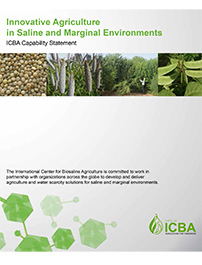Capability Statement

The International Center for Biosaline Agriculture - ICBA is an international, non-profit agricultural applied research center established in 1999 in Dubai, United Arab Emirates (UAE). Originally, the Center was established as a research and development institute focused on the problems of salinity and using saline water for irrigated agriculture. Since then, it has evolved and broadened its initial focus to research and development programs focused on improving agricultural productivity and sustainability in marginal and saline environments.
ICBA takes innovation as a core principle and adopts a multi-pronged approach for addressing the closely linked challenges of water, environment, income, and food security. ICBA’s research innovations includes the assessment of natural resources, climate change adaptation, crop productivity and diversification, aquaculture and bio-energy and policy analysis.
ICBA contributes to the attainment of the global sustainable development goals (SDG1, 7, 12 & 13) by working on a number of technology developments including the use of conventional and non-conventional water (e.g. saline water, treated wastewater, industrial water, agricultural drainage, and seawater); water and land management technologies and remote sensing and modeling for climate change adaptation.
Improving the generation and dissemination of knowledge is an important strategic objective of ICBA and the Center is focusing on developing itself as a Knowledge Hub on sustainable management and use of marginal resources for agricultural production in marginal environments. With the help of its partners, ICBA innovates, builds human capital, and encourages the learning that is fundamental for change.
ICBA’s work reaches many countries around the world, including the Gulf Cooperation Council (GCC) countries, the Middle East and North Africa (MENA), Central Asia and the Caucasus (CAC), South and South East Asia (SSEA), and Sub-Saharan Africa (SSA).
Much of our innovative applied research work is funded by three core donors; the Ministry of Environment and Water of the United Arab Emirates, the Environment Agency - Abu Dhabi, and the Islamic Development Bank. We gratefully acknowledge their support as well as the support of many other donor agencies that have sponsored components of our work over the years.










